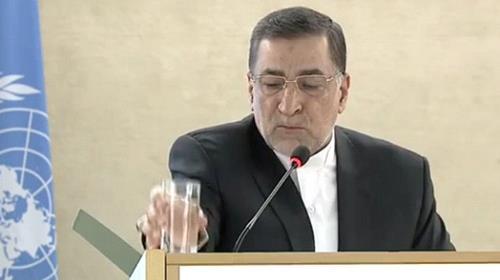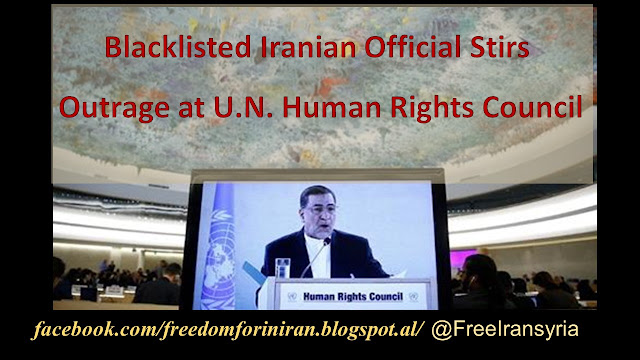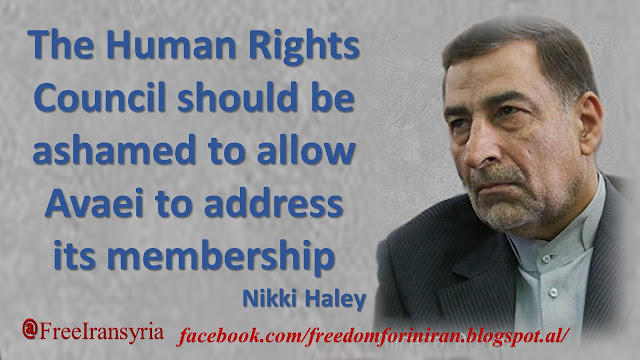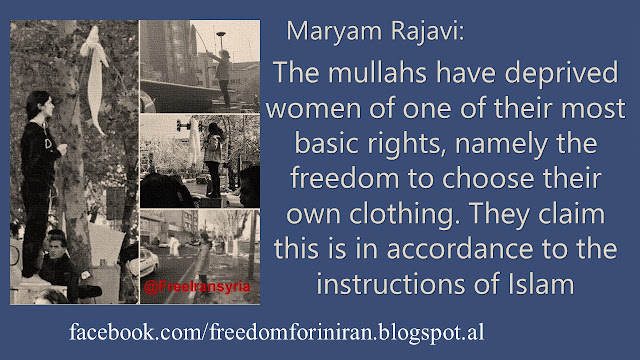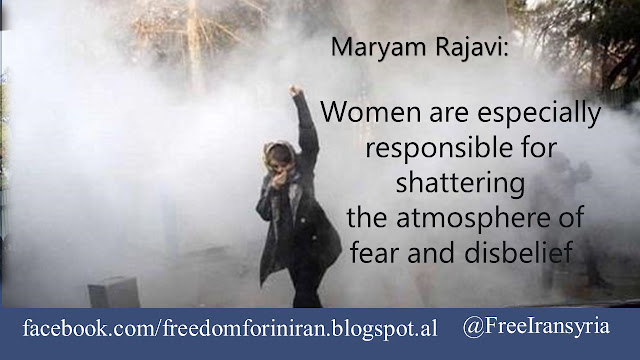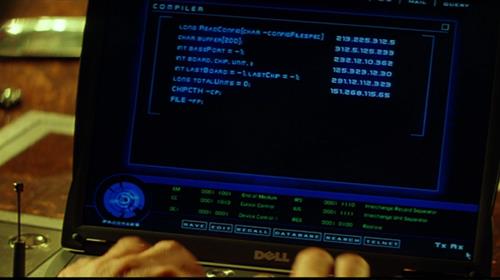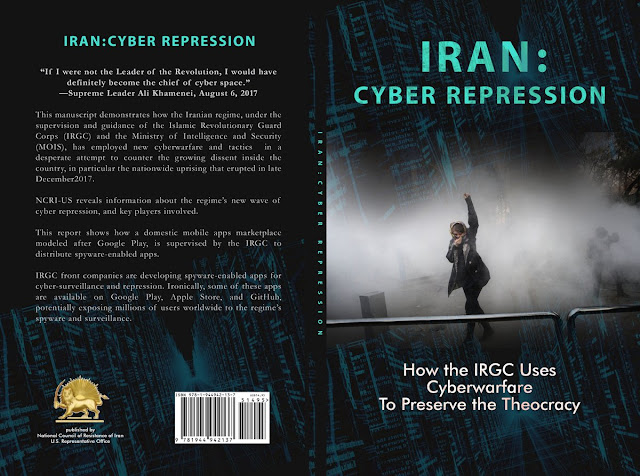Iran's New Chief Justice Is a Mass Murderer
Who is Ebrahim Raisi, the Iranian regime’s new chief of judiciary? On March 7, 2019, after weeks of delay, Ali Khamenei, the supreme leader of Iranian regime, appointed Ebrahim Raisi as the head of the judiciary. Raisi is a cleric known as a criminal for participating in the largest massacre and genocide after World War II, the massacre of 30,000 political prisoners in 1988.
Before joining the judiciary, he was the Special Attorney General for clerics, caretaker of the Astan-e-Quds-e-Razavi charity foundation and a member of the Assembly of Experts. During the presidential election of 2017, Raisi was nominated as Khamenei’s favored candidate. But as a result of persistent revelations by the Iranian Resistance and PMOI/MEK about his role as a perpetrator of the killing and massacre of 30,000 political prisoners, he faced serious obstacles in his goal to climb to power.
Who is Ebrahim Raisi?
Read more
Khamenei Appoints Ebrahim Raisi, Member of Death Committee in Massacre of Political Prisoners, as Head of Regimes' Judiciary
Ali Khamenei, leader of Iran’s religious dictatorship, appointed Ebrahim Raisi, a member of the Death Committee in the massacre of 30,000 political prisoners in 1988, and a devoted supporter of the supreme leader, as head of Iran’s judiciary.
Raisi should be subject to international prosecution for committing crimes against humanity in the massacre of political prisoners in 1988, and tried for genocide of PMOI members. His appointment as the highest judicial authority of the clerical regime signals a hard turn to even more repression by the clerical regime against the Iranian people and resistance. Khamenei described his appointment as a "new era" and the “second stage” of the regime’s so-called revolution, and ordered Raisi not “to pay heed to outsiders when dealing with judicial matters.”
In 1988, Grand Ayatollah Hossein-Ali Montazeri, Khomeini’s successor at the time, and a higher-ranking cleric than Khamenei and his minions, summoned members of the Death Committee including Raisi. Montazeri addressed them in a meeting that was recorded and later published, stating, “The greatest crime committed under the Islamic Republic, for which history will condemn us, has been committed by you. Your (names) will in the future be etched in the annals of history as criminals.”
In addition to committing a major crime in the 1988 massacre, Raisi is a low ranking cleric without adequate religious credentials. He is under the control of Khamenei and has been serving in the regime's repressive agencies since the age of twenty. Appointing him as the head of the regime's judiciary will prove unacceptable for many government-affiliated clerics. During the sham presidential elections in May 2017, the regime’s rank-and-file clerics refused to support Raisi despite coercive pressure by Khamenei. Rouhani, who competed against Raisi during the sham elections, said of Raisi that he was one of those who “only knew execution and prisons for 38 years."
Read more
JUSTICE MINISTER’S SPEECH HIGHLIGHTS IRAN’S ONGOING DISREGARD FOR HUMAN RIGHTS
IRAN NEWS UPDATE, 01 March 20 18-- On Wednesday, the UN Dispatch pointed to the previous day’s speech to the UN Human Rights Council by Iranian Justice Minister Alireza Avaei, in order to highlight the “contentious” relationship between that body and the Islamic Republic. Avaei’s speech had been a source of controversy since the list of speakers at the newly opened session of the HRC was publicized last week. The council noted that the Iranian official was not directly invited and that any UN member state may address a session’s opening and choose its own representative. Nonetheless, human rights activists and opponents of Iran’s clerical regime urged world powers and the HRC to condemn Avaei and cancel his speech. NCRI specifically called upon the EU to condemn Avaei’s appearance before the HRC. AFP and AP also reported on the positions of the Iranian Resistance and quoted: “Allowing Avaie to address the Human Rights Council is disgraceful and would make a mockery of the United Nations and its human rights mechanisms,” Shahin Gobadi, a member of the National Council of Resistance of Iran, told AFP
Read more

Critics Blast UN for Giving Iran’s Justice Minister a Platform at Human Rights Council
The Tower, Feb, 28, 2018 - Protesters gathered outside as Iran’s Justice Minister Alireza Avaei, who is under a European Union travel ban for human rights violations, spoke before the United Nations Human Rights Council, The New York Times reported Tuesday.
Avaei, who, like his predecessor, Mustafa Pour-Mohammadi, played a role in thousands of summary executions in the 1980s, was sanctioned in 2011 by the European Union for “arbitrary arrests, denials of prisoners’ rights and increase of executions” during the time he served as President of Tehran Judiciary. He was able to attend the council’s opening session because Switzerland is not a member state of the EU.
A protest organized by the National Council of Resistance of Iran ( NCRI ) had about a hundred people outside the council’s building. One of the protesters told VOA News that Avaei was one of those responsible for carrying out the mass killings of political prisoners in 1988 at the behest of Iran’s Supreme Leader at the time, Ayatollah Ali Khamenei.
Read more
Blacklisted Iranian Official Stirs Outrage at U.N. Human Rights Council
GENEVA, New York Times, Feb. 27, 2018 — He was a prosecutor of Iran’s Islamic revolution and acquired a notorious reputation for the arbitrary executions of thousands of opponents. A few decades later he oversaw the judiciary’s 2009 trials of anti-government protesters and was denounced overseas, not least by the United Nations .
But on Tuesday the former prosecutor, Alireza Avaei, now Iran’s minister of justice, appeared at the United Nations Human Rights Council in Geneva, one of nearly 100 ministers and dignitaries to speak at the start of its main session this year. The reaction inside and outside the council was outrage.
Read more
Iranian regime minister addresses UN rights body despite harsh criticism
GENEVA, Washington Post, Feb. 28, 2018 — Iran’s justice minister, a sanctioned human rights violator, unapologetically took the podium at the U.N.’s top human rights body Tuesday to berate U.S. and Saudi policies, defying calls for him to stay away in a visit a top U.S. diplomat said made a “mockery” of the body.
Justice Minister Alireza Avaei’s visit has been criticized because he’s faced EU sanctions for six years for his role in arbitrary arrests, denying prisoners’ rights, and increasing executions in Iran. Switzerland, which hosts a key U.N. office and the council, has also handed him economic sanctions — but not banned him from visiting.
Read more
Protests Against U.N. Speech by Iran Regime's Minister, Implicated in Mass Executions
NCRI - The Iranian community in Switzerland, supporters of the National Council of Resistance of Iran (NCRI), on Tuesday held a rally in front of the UN Headquarters in Geneva against Alireza Avaei, Justice Minster of the clerical regime, at the Human Rights Council.
Avaei has been directly implicated in the massacre of 30,000 political prisoners, the majority of whom were members and supporters of the main opposition movement, the People’s Mojahedin Organization of Iran (PMOI/MEK), in 1988. He was a member of the Death Commission in Khuzestan Province that sent many political prisoners, including juveniles, to execution during the massacre.
Scores of families of victims of the 1988 massacre took part in Tuesday’s protest.
The Geneva protest continued for several hours despite the bitter cold weather. The protesters waved Iranian flags with the ‘lion and sun’ insignia.
AFP: Feb. 27, 2018.-Protests Against Presence of Iran Regime's Sanctioned Minister in U.N.
NCRI Submits a Complaint to the Swiss General Prosecutor Against Alireza Avaei
Appeal to the UN High Commissioner for Human Rights: Human Rights Council must be a forum to investigate Avaei’s crimes
Simultaneous with arrival of the Iranian regime’s Minister of Justice, Alireza Avaei, in Switzerland on February 26, Marc Bonnant, a distinguished Swiss lawyer, submitted a complaint on behalf of the NCRI to the Swiss General Prosecutor, Michael Lauber, calling for prosecution of Avaei for crimes against humanity. Avaei was one of the officials involved in Massacre of political prisoners in 1988.
The complaint file that contains criminal records of Avaei states that welcoming him in Switzerland “profoundly contradicts morale and the rights” and “the Human Rights Council of the United Nations is wrongly welcoming him to speak ironically about the human rights.” The complaint goes on saying that Avaei’s record “has earned him financial sanctions within the European Union” and he is also on the Swiss blacklist for “human rights violations, arbitrary arrests, denial of the rights of prisoners and executions.”
The file also refers to Avaei’s role in the 1988 massacre of political prisoners in the western province of Khuzestan, including Dezful, and based on eyewitness accounts adds: “In conclusion of a thorough analysis, the massacres of political opponents perpetrated during the great wave of repression from the end of July 1988 to January 1989, must be legally classified as crimes against humanity within the meaning of art. 7 of the Rome Statute of the International Criminal Court of 1998, the content of which is reflected in Art. 264a CP.”
In the meantime, Mohammad Mohaddessin, Chair of the NCRI’s Foreign Affairs Committee, wrote to the UN High Commissioner for Human Rights, Zeid Ra’ad al-Hussein, urging him to cancel Avaei’s intervention at the opening session of the Human Rights Council and said, this would remain “as a dark stain on the Council and would be considered as an affront against people of Iran in general and families of victims in particular.” He added, “It is now time to end offering important international forums on human rights to such criminals and instead take measures to hold them accountable and end their impunity. These forums must turn into bodies to investigate their crimes,” especially due to the fact that Avaei’s crimes has continued to date. As the Minister of Justice, he is directly or indirectly responsible for the arrest of at least 8000 people during the protests started on December 28, 2017, and killing of some 50 protesters in the streets or under torture.
Secretariat of the National Council of Resistance of Iran
February26, 2018
Nikki Haley: The Human Rights Council should be ashamed to allow Avaei to address its membership
Press Release: Ambassador Haley on Iran Human Rights Violator Speaking at UN Human Rights Council
February 25, 2018
This week, Iran’s Minister of Justice, Seyyed Alireza Avaei, is set to address the UN Human Rights Council. Mr. Avaei is responsible for some of the worst human rights violations in Iran, including preventing political freedoms and promoting repression, violence, and extrajudicial killings of political prisoners.
“The Human Rights Council should be ashamed to allow Mr. Avaei to address its membership. Yet again the Council discredits itself by allowing serial human rights abusers to highjack its work and make a mockery of its mandate to promote universal human rights. This does nothing but reinforce the United States’ call for much needed reforms at the Council for it to be viewed as a good investment of our time and money,” said Ambassador Haley.
The Iranian Resistance condemns in the strongest terms the planned trip by the Iranian regime’s Justice Minister Alireza Avaei, a perpetrator of the 1988 massacre, to Geneva to address the United Nations Human Rights Council. It calls for his speech to be cancelled and for Avaei to face arrest and prosecution for crimes against humanity.
OIAC strongly denounces the planned appearance at the United Nations Human Rights Council (UNHRC) by Iranian Justice Minister Alireza Avaei,
We call on the United Nations Human Rights Council to resend its invitation to Avaei and urge it instead to consider rightful grievances of the 1988 massacre victims.”
— OIAC
Ban Iran’s Justice Minister from addressing UN Human Rights Council over his role in crime against humanity in 1988 massacre
Families of the victims of the 1988 massacre are deeply concerned over the planned participation of the Iranian Justice Minister Alireza Avaei at the High-Level Segment of the 37th Session of the Human Rights Council on 27 February 2018.
Although Justice for the Victims of the 1988 Massacre in Iran (JVMI) feels that with its appalling human rights record no high-level delegate from the Islamic Republic of Iran should be welcome to address the HRC, Avaei’s attendance is far more disconcerting.
Avaei was Prosecutor-General and member of the 1988 Death Commission in Dezful, south-west Iran, that extra-legally sent large numbers of political prisoners to their death. At a civil society hearing in Geneva on 1 February 2018, survivors of the massacre and international human rights experts testified about the massacre which under the definition of the Rome Statute constituted a crime against humanity. Avaei’s name was repeatedly brought up over his role in the massacre.
READ MORE
What Are Iran Regime's Criminals Doing in the UN Human Rights Council?
Two months have passed since Iran’s uprising. A revolt that continues to wreak havoc across the ruling regime in Iran. Senior officials, terrified of the consequences and awaiting punishments in the near future from the Iranian people, are busy pointing fingers at others for years of crimes and crackdown.
Two such examples vividly explain this reality.
The horrific murder of Iranian-Canadian photojournalist Zahra Kazemi has remained silent for years. She was arrested in Iran back in 2003 and murdered after horrific torture. Her body was not given to her family and buried by the authorities, while completely denying the murder. Reports indicate they splashed her body with acid to destroy any evidence of crimes.
Nearly 15 years later, Ali Younesi, former intelligence minister under Mohammad Khatami, acknowledges the fact that authorities murdered her. However, to deny any role for himself and the “reformist” Khatami he accused former Tehran public prosecutor Saeed Mortazavi as the main individual behind Kazemi’s death.
READ MORE
RELATED:
#1988Massacre-#Ian-30th anniversary of the #massacre:of 30,000 political prisoners & #MaryamRajavi’s remarks
Calls for Independent International Inquiry Into 1988 Massacre of Political Prisoners in Iran
Call for justice for the victims of the massacre of the political prisoners in 1988 in Iran
A Call to Strip Immensities of the Perpetrators of the 1988 Massacre in Iran
Iran is bulldozing the mass grave from the mullahs' 1988 massacre
Iranian people, Join Justice-Seeking Movement
JUSTICE SEEKING MOVEMENT HAS SHAKEN UP THE REGIME RELYING ON MASSACRE
Political Prisoners seeks justice and call to Prosecute Perpetrators of Iran 1988 Massacre
Glorious Epics–what happened in jails during 1981 to 1988 Massacre?
Living lives of dignity, courage and freedom,the Women who Made History
Articles about 1988 Massacre in Iran
THE U.N. MUST INVESTIGATE IRAN'S 1988 MASSACRE, OR DETAINED PROTESTERS TODAY FACE SAME FATE
SEEKING JUSTICE FOR VICTIMS OF 1988 MASSACRE IS INDISPENSABLE FOR THE IRANIAN NATION’S CAMPAIGN TO OVERTHROW THE REGIME IN IRAN
The Rise in Justice-Seeking Movement for 1988 Massacre
IRAN-NCRI-IRANMASSACRE1988-The Tale of Red Roses a shocking video
Mass executions on the anniversary of massacre of political prisoners
#1998massacre-Untold story of Mahmood Hassani one of Iran's 30,000 political prisoners executed in summer of 1988
The 1988 massacre of political prisoners in Iran and the nuclear deal
Follow Freedom for Iran on https://www.facebook.com/freedomforiniran.blogspot.al/


